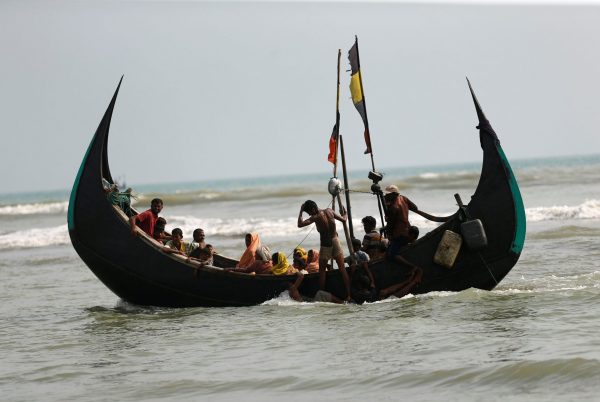Though Myanmar’s maritime security outreach has occurred mostly at the bilateral level, it does participate in multilateral maritime security initiatives with ASEAN such as the Bay of Bengal Initiative for Multi-Sectoral Technical and Economic Cooperation (BIMSTEC), the Indian Ocean Naval Symposium and the MILAN naval exercises. This international outreach is met with enthusiasm by regional and extra-regional powers who see enormous economic and strategic benefit in a ‘normalised’ Myanmar given the growing geo-economic importance of the Indo-Pacific.
India, which shares a long maritime boundary with Myanmar, is one of Naypyidaw’s major maritime security partners. The Bay of Bengal has long been an area of geostrategic importance for India, and it has taken on renewed significance — reflected in India’s recent ‘Act East’ policy — since China began making inroads in the Indo-Pacific through its Belt and Road Initiative.
Among India’s regional security concerns is the risk of Pakistani intelligence agencies recruiting fighters from the persecuted Rohingya population in Myanmar and Bangladeshi refugee camps to attack Indian targets. India’s response has been to engage Myanmar during the Rohingya crisis — in September 2017, Indian Prime Minister Narendra Modi made his first bilateral visit to Myanmar where 11 agreements were signed, including on maritime security cooperation.
China too has high stakes in Myanmar’s strategic location, having invested significantly in Myanmar’s maritime infrastructure development. In May, it was reported that China’s CITIC Group proposed taking a stake worth up to 85 per cent in the US$7.3 billion deep sea port in Kyaukpyu in Rakhine state. In September, Chinese Foreign Minister Wang Yi emphasised China’s support for Myanmar’s efforts to protect its national security.
Given Myanmar’s strategic importance to these two rising Asian powers, it is expected that they will continue to engage Myanmar in the maritime security realm regardless of the Rohingya crisis. This would provide Myanmar some cushion against international backlash on the Rohingya issue, as well as ensure its continued inclusion in regional maritime security exercises.
But Myanmar’s domestic instability could yet damage its maritime security prospects with its ASEAN partners. The Rohingya crisis has exacerbated two non-traditional maritime security issues in the region: boat refugees and arms smuggling.
The events unfolding in Rakhine State and the mass exodus of asylum seekers via land and sea is foremost a humanitarian issue, but it has serious security implications as well. Asylum seekers from Bangladesh and Myanmar who sail via the Bay of Bengal for refuge in Southeast Asian countries first grabbed international headlines in May and June 2015 when they became stranded in the Andaman Sea. Late last month at least 46 were killed when a vessel en route to Bangladesh capsized.
Myanmar and regional states are well aware of the nexus between vulnerable asylum seekers at sea and the trafficking of humans, arms and drugs. Arms smuggling is a serious problem for Myanmar, as the border area between Bangladesh and Myanmar is a sanctuary for arms smugglers due to its extensive coastline and weak maritime surveillance capabilities.
Smugglers ship various types of small arms from Thailand and other Southeast Asian states through these waters to sell them to insurgents in India, Bangladesh and Myanmar. The Rakhine crisis has provided an opening for Islamist militant groups to rally support for their cause. Against the backdrop of a fast-growing presence of the so-called Islamic State in South and Southeast Asia, arms trafficking has become a greater threat to Myanmar’s national security.
An informal ASEAN Foreign Ministers’ Meeting was held in September, but no concrete action plan was set with regard to the ongoing situation in Myanmar or to the potential influx of asylum seekers in the region. With some of ASEAN’s Muslim member states (notably Malaysia) openly criticising ASEAN for its non-interventionist stance on the Rohingya crisis, Myanmar’s maritime security relations with certain ASEAN states could potentially come under strain.
The ongoing Rohingya crisis has perhaps impacted prospects for maritime security cooperation with Western states the most. The United Kingdom has suspended its fledgling officer training program and the United States dropped its plans to expand training for Myanmar’s military in areas like maritime security and combating human trafficking.
For decision makers in Myanmar, the perceived danger of international pressure over the Rohingya crisis leading to a seaborne military intervention by foreign powers is very real. Similar deep-seated worries over external aggression were evident following Cyclone Nargis, when the French government threatened to push for a UN resolution and intervene militarily on humanitarian grounds after the Myanmar government inhibited the delivery of external aid to affected communities. All these concerns are likely to factor into Myanmar’s maritime strategic planning.
Rajni Gamage is a Senior Analyst in the Maritime Security Programme at the Institute of Defence and Strategic Studies, S Rajaratnam School of International Studies (RSIS), Nanyang Technological University, Singapore.

